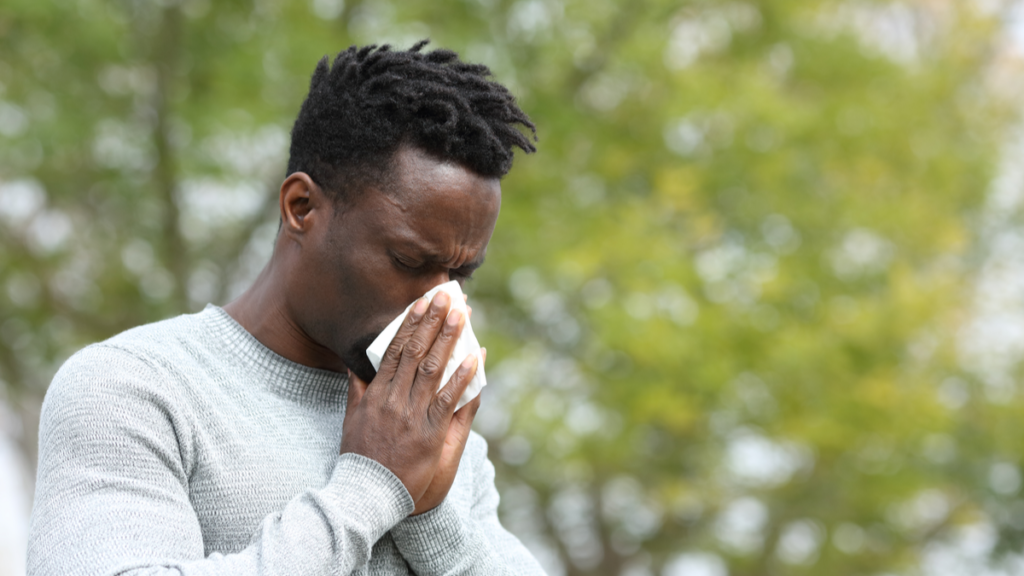Scientists have long known that as the earth warms due to climate change, plants produce more pollen, making the allergy season longer and more pronounced Black Health TV.

Now, a new poll shows that hay fever sufferers are increasingly taking note.
In a survey of more than 2,000 U.S. adults conducted by Harris Poll in collaboration with HealthDay, only one in three respondents said they had received an official hay fever diagnosis from a doctor, but three in four said they had suffered from seasonal allergy symptoms.
For most of these individuals, seasonal sneezing is no walk in the park – 74% said their symptoms affect their overall quality of life. And according to Kathy Steinberg, vice president at Harris Poll, “other items in the survey suggest that the situation will only get worse.”
As part of the survey, about 1,500 respondents suffering from allergies rated how much they agreed or disagreed with a number of statements, including: “I feel like my seasonal allergies are getting worse every year”. “My seasonal allergy symptoms have started earlier in the season in recent years”. “I now suffer from seasonal allergy symptoms year round”.
When responding to these statements, participants were divided. About half strongly or somewhat agreed with the statements, while the others strongly or somewhat disagreed.
“For many, symptoms get worse each year, or they occur year-round, or they start earlier in the season than in previous years,” Steinberg said.
The trend toward longer and more intense pollen seasons will likely become more noticeable to those affected as global warming continues.
“The people who say [their allergies] seem to be getting worse may very well be having more problems based on the scientific data we have about temperature increases and pollen increases,” Stanley Fineman, MD, said in a HealthDay Now interview. Fineman is an allergist at Atlanta Allergy & Asthma and a past president of the American College of Allergy, Asthma and Immunology.
“If warming trends continue, we will likely see higher and higher pollen counts as the seasons start earlier,” he said.
In a recent study, researchers modeled future pollen counts and concluded that total pollen emissions could increase by as much as 40% by 2100. They found that the spring pollen season is expected to start 10 to 40 days earlier, while seasonal allergies in the fall will last up to 19 days longer.
These escalations would be in addition to the increase in pollen counts that has already been occurring for decades. According to another study, pollen counts in 2018 were already 20% higher than in 1990.
Higher temperatures, bigger blooms
Climate change is affecting pollen counts in two ways: According to William Anderegg, associate professor of biology at the University of Utah, both warmer temperatures and higher carbon dioxide emissions are responsible for pollen production.
“The scientific link between climate change and longer and more severe pollen seasons is incredibly clear. When you increase the temperature or CO2 levels in the atmosphere, plants tend to produce more pollen,” Anderegg said. “They tend to get bigger and produce more pollen per plant.
These byproducts of human activity also shorten the winter season and lengthen the spring and fall growing seasons. Longer growing seasons give plants time to produce more pollen.
Fineman and his Atlanta practice have tracked daily pollen counts in the region for more than 40 years. In 2021, they published a study based on that data that showed pollen emissions from oak trees had increased 5% each year for the previous 27 years.
Fineman said he typically advises his patients to start taking their allergy medications two weeks before the pollen season begins. And that timing has come earlier and earlier over the years as the pollen season has lengthened.
For many years, it was around St. Patrick’s Day. After that, it was Valentine’s Day. And in the last two years, pollen counts peaked in the Atlanta region, forcing him to notify his patients around Groundhog Day.
These shifts can confuse longtime allergy sufferers who are used to taking their antihistamines or receiving their first immunotherapy shot at certain times of the year. Allergy Treatments


